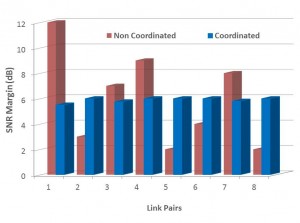What is it?
Coordinated calibration is the ability to manage and control the “wake-up” of each modem in a bonded link in order to optimize the total link throughput and stability.
Why is it important?
Most EFM vendors allow each modem to train independently, either to maximize the bit rate it can achieve, or to target a conservative and generally achievable estimate of the bit rate for given conditions. While these types of training algorithms are easy to implement, they only produce good results in cases where one or possibly two copper pairs are used. In the case of scalable EFM over Copper bonded copper links using 4 or more bonded copper pairs or for scenarios where multiple 1- or 2-pair systems operate in the same binder, the results of these independent training procedures are far less impressive. Under most operating conditions, these algorithms result in total bit rates that are significantly lower than what is really achievable, and in signal to noise ratio (SNR) margins that are imbalanced (e.g., 2 dB on one pair, 16 dB on another pair), leading to reduced operational performance, stability and reliability issues. In contrast, Actelis Networks’ patented dynamic crosstalk cancellation and coordinated calibration algorithms use more sophisticated training procedures with key operational benefits: :
- Synchronizes the wake-up of all modems
- Monitor the bitrate and SNR margin achieved by all the modems in the system, even across different links
- Adjusts the target bitrate and SNR margin of each modem to ensure maximum performance for the overall bonded high speed link
The performance of a modem on any given pair in the binder can impact the bit rate achievable by other modems in the group. Trying to optimize each modem serially and in an uncoordinated fashion typically cannot result in complete link optimization because as additional modems are brought online and optimized, the performance of others already optimized can be degraded, and the balance of performance on individual pairs is not optimized to maximize overall link performance. A high SNR margin effectively “shields” the high speed link against performance degradation due to noise. By ensuring noise resilient distribution of rates over different pairs in the link, susceptibility to interference and changes in the noise environment are reduced, resulting in higher reliability and link stability. Coordinated calibration improves performance in real world environments by ensuring
- Higher overall link throughput
- Minimized potential for service interruption

